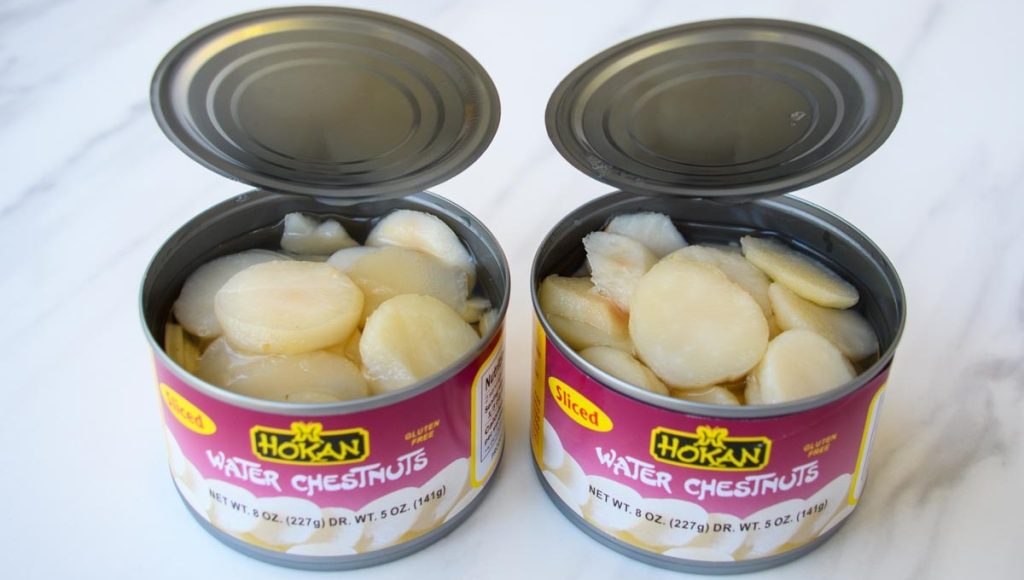Water chestnuts are a type of aquatic vegetable commonly used in various Asian cuisines. While water chestnuts are generally not toxic to dogs and are considered safe in small quantities, they don’t offer significant nutritional benefits for your canine companion.
Dogs are primarily carnivorous animals, and their dietary needs are best met with a balanced diet that includes high-quality dog food specifically formulated to provide essential nutrients.
It’s essential to keep a few considerations in mind if you decide to offer your dog water chestnuts.
First, water chestnuts should be cooked and served plain, without any added seasonings or sauces. Some seasonings or preparations used in human dishes can be harmful to dogs.
Second, water chestnuts are relatively high in carbohydrates, which may not be suitable for all dogs, especially those with specific dietary restrictions, like diabetic dogs.
Finally, always feed water chestnuts in moderation to prevent digestive upset, and be mindful of any adverse reactions or sensitivities your dog may have to this vegetable.
Are Cooked Chestnuts Good for Dogs?
Yes, cooked chestnuts can be safe for dogs in moderation. Ensure they are thoroughly cooked, free of shells and skins to avoid choking hazards. Feed in moderation, watch for allergies, and avoid seasoned or salted varieties.
Can Dogs Eat Frozen Water Chestnuts?
While water chestnuts themselves are not toxic to dogs, it’s essential to consider how they are prepared and whether any additional ingredients or seasonings are involved.
In their raw form, water chestnuts are generally safe for dogs to consume in moderation. However, frozen water chestnuts may have additives or preservatives.
Are Chestnuts Toxic for Dogs?
No, chestnuts are not toxic for dogs. In fact, they can be a healthy and nutritious treat for your four-legged friend.
Chestnuts are a good source of vitamins A and C, as well as fiber and protein. They also contain antioxidants that can help protect your dog’s cells from damage.
Are Water Chestnuts Toxic?
No, water chestnuts are generally not toxic. They are a type of aquatic vegetable commonly used in Asian cuisine. The edible part is the corm, a bulb-like growth found underwater.
However, it’s essential to distinguish water chestnuts from horse chestnuts, which are toxic and not meant for consumption.
Do Animals Eat Water Chestnuts?
Yes, animals do eat water chestnuts. Water chestnuts are a type of aquatic plant that grows in marshes, ponds, and lakes.
The fruit of the water chestnut is encased in a hard, brown shell and has a white, starchy flesh. The nut is often eaten raw or cooked and has a crunchy texture.
Animals such as ducks, geese, and swans eat water chestnuts as part of their diet.
Can Dogs Eat Chestnut?
Dogs can safely eat chestnuts, but there are a few things to keep in mind. Chestnuts are high in fat and calories, so they should be given in moderation. They also contain a compound called escin, which can cause gastrointestinal upset if consumed in large amounts.
When feeding chestnuts to your dog, make sure to remove the hard outer shell and cook them until they’re soft. This will help reduce the risk of gastrointestinal issues.

Can Dogs Eat Bamboo Shoots?
Bamboo shoots are a type of vegetable that is often used in Asian cuisine. They have a crunchy texture and slightly sweet flavor. Bamboo shoots are safe for dogs to eat in small amounts.
However, they should not be a dog’s main source of nutrition as they are not very nutritionally dense. Bamboo shoots contain soluble fiber, which can help to regulate a dog’s digestive system. They also contain some vitamins and minerals, such as vitamin C, potassium, and magnesium.
When feeding bamboo shoots to your dog, be sure to cut them into small pieces to prevent choking hazards. You can serve bamboo shoots raw or cooked.
Conclusion
Yes, dogs can eat water chestnuts. They are safe for dogs to consume and provide a healthy source of nutrients. Water chestnuts are high in fiber and low in calories, making them an ideal snack for dogs.
Additionally, water chestnuts are a good source of potassium, which is an essential mineral for dogs.